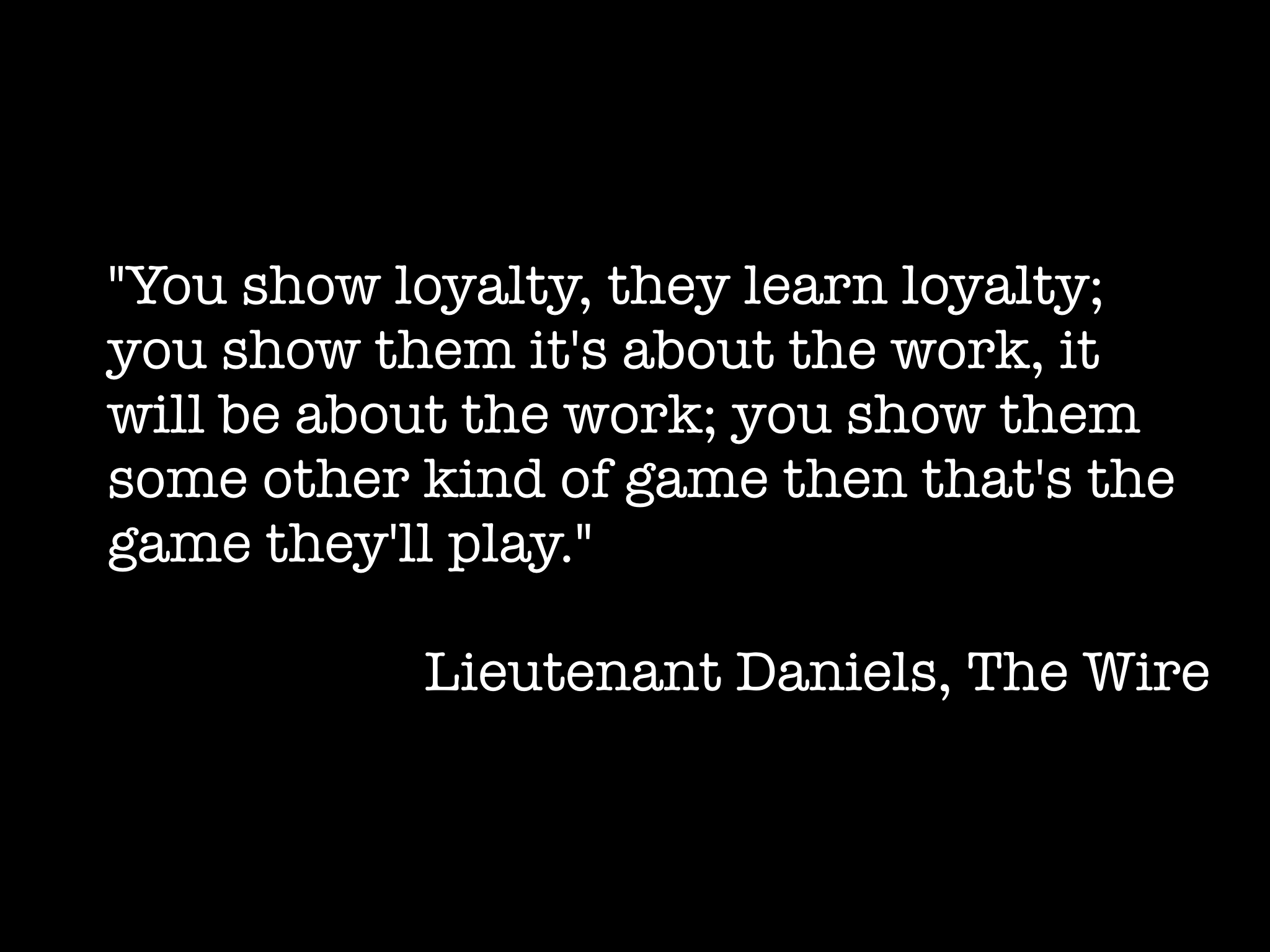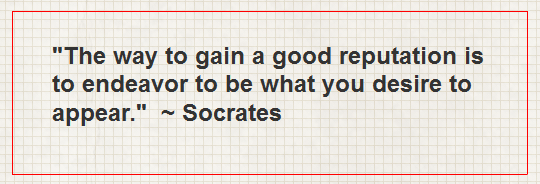““When you come right down to it, leadership is, of course, being exerted all the time in the capacity of boosting morale, confidence and all that, but leadership is most noticeable when tough decisions finally have to be made. This is the time when you get conflicting advice and urgent advice of every kind. Now this is the kind of leadership that’s often concealed from the public.… But making decisions is of the essence in leadership—that is, handling large problems whether or not you are at war or at peace. When you make these decisions it is not done with any reaching for the dramatic. It is almost everyday and commonplace. You reach a conclusion based upon the facts as you see them, the evaluations of the several factors as you see them, the relationship of one fact to another, and, above all, your convictions as to the capacity of different individuals to fit into these different places. You come to a decision after you’ve taken all these things into consideration. Then you decide and say, ‘That’s what we’ll do.’” General Dwight D. Eisenhower
— American Generalship: Character Is Everything: The Art of Command by Edgar Puryear
Adaptive Situational Awareness
“A leader is only as effective as their capability to recognize and understand their surroundings, whether it is a crisis, a team, or a project. I always begin with promoting adaptive situational awareness, meaning a leader has to have systems that provide them accurate and timely information, is accepting of bad news, and is willing to pivot in light of changing circumstances. In so many cases in homeland security or crisis management, it is the failure to capture fully the magnitude or the situation that leads to consequences that could have been avoided.” Juliette Kayyem, Senior Belfer Lecturer in International Security at Harvard’s Kennedy School of Government,
Self-Leadership
Without mature self-leadership competencies, leaders face an increasingly unsustainable environment. The stress of growing job complexity, difficult decisions, limited time, information overload, the high stakes of negative consequences (this list goes on for a while) combined with the attention required to maintain family, friends, church, hobbies (this list also goes on) can be impossible to manage. UNLESS you understand that self-leadership comes before all other levels of leadership (direct-, organizational-, strategic-) and have ingrained the self-leadership disciplines you need to sustain the leadership environment.
Self-Leadership is a continual cognitive discipline that strengthens the spiritual core and builds mental, physical, and emotional wellness to maximize performance and happiness* to reach personal and organizational objectives.
*The Stoics defined happiness (eudaimonia) more deeply as “flourishing” and “living in agreement with your purpose (nature).” Contrast with “hapless”
It’s about what you show them
 [Your subordinates] will take queue from you: You show loyalty they learn loyalty; you show them it’s about the work it will be about the work; you show them some other kind of game then that’s the game they’ll play….there will come a day when you will have to decide if it’s about you or about the work. Lieutenant Daniels, The Wire
[Your subordinates] will take queue from you: You show loyalty they learn loyalty; you show them it’s about the work it will be about the work; you show them some other kind of game then that’s the game they’ll play….there will come a day when you will have to decide if it’s about you or about the work. Lieutenant Daniels, The Wire
Favorite quotes from Zen and the Art of Motorcycle Maintenance: An Inquiry into Values – Robert M. Pirsig
“We want to make good time, but for us now this is measured with emphasis on “good” rather than “time” and when you make that shift in emphasis the whole approach changes.”
“The truth knocks on the door and you say, ‘Go away, I’m looking for the truth,’ and so it goes away. ”
“Sometimes it’s a little better to travel than to arrive”
“In the high country of the mind one has to become adjusted to the thinner air of uncertainty, and to the enormous magnitude of questions asked, and to the answers proposed to these questions….one hesitates even to go near for fear of getting lost in them and never finding one’s way out…. (From above) The sweep goes on and on and on so obviously much further than the mind can grasp.”
“You are never dedicated to something you have complete confidence in. No one is fanatically shouting that the sun is going to rise tomorrow”
“To live only for some future goal is shallow. It’s the sides of the mountain which sustain life, not the top.”
“For every fact there is an infinity of hypotheses.”
“The past cannot remember the past. The future can’t generate the future. The cutting edge of this instant right here and now is always nothing less than the totality of everything there is.” [The ancient greeks] saw the future as something that came upon them from behind their backs with the past receding away before their eyes.”
“The place to improve the world is first in one’s own heart and head and hands, and then work outward from there.”
“‘Man is the measure of all things.’ Yes….The Quality which creates the world emerges as a relationship between man and his experience. He is a participant in the creation of all things.”
Every time I study Biblical writings…
“In the high country of the mind one has to become adjusted to the thinner air of uncertainty, and to the enormous magnitude of questions asked, and to the answers proposed to these questions. The sweep goes on and on and on so obviously much further than the mind can grasp one hesitates even to go near for fear of getting lost in them and never finding one’s way out.” Robert M. Pirsig, Zen and the Art of Motorcycle Maintenance
Lessons from Peter’s Restoration – Sermon Notes
Reading
When they had finished eating, Jesus said to Simon Peter, “Simon son of John, do you love me more than these?”
“Yes, Lord,” he said, “you know that I love you.”Jesus said, “Feed my lambs.”
Again Jesus said, “Simon son of John, do you love me?”
He answered, “Yes, Lord, you know that I love you.”
Jesus said, “Take care of my sheep.”The third time he said to him, “Simon son of John, do you love me?”
Peter was hurt because Jesus asked him the third time, “Do you love me?” He said, “Lord, you know all things; you know that I love you.” Jesus said, “Feed my sheep. (John 21:15-17 NIV)
The questions and answers
What did Jesus mean when he asked if Peter loved him “More than these?” Possible choices ( there is no agreement on which one it is):
Do you love me more than these (other disciples love me)?
Do you love me more than (you love) these (other disciples)?
Do you love me more than (you love) these things (your fishing nets and equipment)?
Types of love:
Agape = a perfect, unselfish love
Phileo = Lord, You know that I’m Your friend,” or “I’m fond of You
1. Jesus, “do you Agape me.” Peter, “I Phileo you”
2. Jesus, “do you Agape me.” Peter, “I Phileo you”
3. Jesus, “do you Phileo me.” Peter, “I Phileo you”
The commands
1. The first command Jesus gives Peter is literally translated from Greek as “pasture the lambs. As present tense it calls for continual action of care and feeding
2. The second time Jesus gives the command it literally translates as “tend My sheep” emphasizing a supervisory capacity, not only feeding but ruling over them.
3. The third time, the literal translation is a combination if the previous two commands. “pasture tend the sheep”. Here Jesus combines the different Greek words to make clear the job of the shepherd of the flock of God. They are to tend, care for, and provide spiritual food for God’s people in continual action to nourish and care for their souls, bringing them into the fullness of spiritual maturity.
Paraphrase Reading
Jesus said to Simon Peter, “Simon son of John, do you love me more perfectly and unselfishly than you do the things of your former life? (Or more than these men do?)”
“Yes, Lord,” he said, “you know that I have affection for you.”
Jesus said, “provide continual care for my lambs who are my disciples.”Again Jesus said, “Simon son of John, do you unconditionally love me?”
He answered, “Yes, Lord, you know that I am fond of you .”
Jesus said, “be a shepherd care of my disciples like a shepherd takes care of a flock.”The third time he said to him, “Simon son of John, do you have affection for me like a friend?”
Peter was grieved because Jesus asked him the third time, “Do you love me?”
He said, “Lord, you know all things; you know that I love you like a friend.”
Jesus said, “you are responsible for the spiritual well being of my disciples like a shepherd is responsible for nurturing his flock.(John 21:15-17 Paraphrase)
Application
1. Change of Attitude.
Peter mourns and becomes meek
Before the denial, Peter was anything but meek…he was over confident in himself.
Peter asked, “Lord, why can’t I follow you now? I will lay down my life for you.” Then Jesus answered, “Will you really lay down your life for me? Very truly I tell you, before the rooster crows, you will disown me three times!
(John 13:37, 38 NIV)Then Jesus told them, “This very night you will all fall away on account of me, for it is written: “ ‘I will strike the shepherd, and the sheep of the flock will be scattered.’ But after I have risen, I will go ahead of you into Galilee.”
Peter replied, “Even if all fall away on account of you, I never will.”
“Truly I tell you,” Jesus answered, “this very night, before the rooster crows, you will disown me three times.”
But Peter declared, “Even if I have to die with you, I will never disown you.” And all the other disciples said the same. (Matthew 26:31-35 NIV)
Peter was grieved. He knew the answer that Jesus was looking for but couldn’t give it.
Why didn’t he ever answer yes, I agape you? In his heart he knew it wasn’t true…he had just called curses down to deny Jesus.
Then he began to call down curses, and he swore to them, “I don’t know the man!” Immediately a rooster crowed. (Matthew 26:74 NIV)
2. On Elders. Peter handed off the responsibility to oversee and provide care for disciples to the elders.
To the elders among you, I appeal as a fellow elder and a witness of Christ’s sufferings who also will share in the glory to be revealed: Be shepherds of God’s flock that is under your care, watching over them—not because you must, but because you are willing, as God wants you to be; not pursuing dishonest gain, but eager to serve; not lording it over those entrusted to you, but being examples to the flock. And when the Chief Shepherd appears, you will receive the crown of glory that will never fade away.
In the same way, you who are younger, submit yourselves to your elders. All of you, clothe yourselves with humility toward one another, because, “God opposes the proud but shows favor to the humble.” Humble yourselves, therefore, under God’s mighty hand, that he may lift you up in due time. (1 Peter 5:1-6 NIV)
Submit.
3. Continue to follow
Peter said, I’m going fishing.”
Jesus had appeared to them two other times. Yet Peter was back to his old life. The temptation is to go back. Don’t.
4. Be ready to lead
Peter did not know—that Jesus would ascend into heaven but when he did he preached the first gospel sermon and, with the help of Jesus brother James, lead the establishment of the church.
Others tried to assert their authority on the church.
John is establishing the role of Peter.
5. There is Hope for me
Peter gave a less than perfect answer but Jesus accepted it. Jesus meets us where we are.
Like Jesus, we should extend the mercy He gives to others
Don’t think you have to be perfect. If you were you would be the rabbi not the disciple. Just continue learning from the master.
Jesus extended mercy…we should too.
Closing.
Blessed are the poor in spirit, for theirs is the kingdom of heaven.
Blessed are those who mourn, for they will be comforted.
Blessed are the meek, for they will inherit the earth.
Blessed are those who hunger and thirst for righteousness, for they will be filled.
Blessed are the merciful, for they will be shown mercy.
Blessed are the pure in heart, for they will see God.
Blessed are the peacemakers, for they will be called children of God.
Blessed are those who are persecuted because of righteousness, for theirs is the kingdom of heaven. (Matthew 5:3-10 NIV)
Follow Me – Sermon Notes
Many statements don’t stand the test of time. Even the most visionary people say things that are proven false and useless with time. In his final days, John records an exchange between Jesus and the disciples who deserted him. The final two words of the exchange are timeless:
Scripture Reading:
Very truly I tell you, when you were younger you dressed yourself and went where you wanted; but when you are old you will stretch out your hands, and someone else will dress you and lead you where you do not want to go.” Jesus said this to indicate the kind of death by which Peter would glorify God. Then he said to him, “Follow me!” Peter turned and saw that the disciple whom Jesus loved was following them. (This was the one who had leaned back against Jesus at the supper and had said, “Lord, who is going to betray you?”) When Peter saw him, he asked, “Lord, what about him?” Jesus answered, “If I want him to remain alive until I return, what is that to you? You must follow me.” (John 21:18-22 NIV)
Follow Me = Discipleship:
As He was going along by the Sea of Galilee, He saw Simon and Andrew, the brother of Simon, casting a net in the sea; for they were fishermen. And Jesus said to them, “Follow Me, and I will make you become fishers of men.” (Mark 1:16, 17 NASB)
The words “Follow Me” have little meaning in our modern world, but they meant everything to a Jew in the first century. A disciple of a Rabbi (or Talmid) would study the Rabbi so closely they would eventually think and act like the Rabbi.
The talmid watched his rabbi’s every action, word and deed, trying to think and act in a similar fashion. His deepest desire was to follow his rabbi so closely that the student would eventually think and act exactly like the rabbi. An old Rabbinic blessing puts it this way: “May you be covered with the dust of your Rabbi.” Meaning, the student was to walk so close to the rabbi that the very dust kicked up by the teacher’s walking would fall on him. Source link.
Consider when the words were written matters
John wrote his gospel at the end of his life, late in the first century. The first generation of apostles and disciples had died/most martyred, including Peter. (Note: John is believed to be the only apostle to die of natural causes.) Christians were increasingly being split by false teachers. By the time John wrote his gospel many differing views of who Jesus was and what it meant to be a Christian were placing a stress on the new religion. Such views included:
Docetic – Jesus was an illusion
Gnostic – special knowledge and all matter is evil
Ebbionite – Jesus was the Messiah but just a man/ not devine. Followed the law and jewish rites
Jews – believers who insisted the Law (circumcision) was still required
Note: Persecution added more strain to the Christian faith. Suffered persecution under Nero (c. 64-68), likely when Peter and Paul became martyrs. Were under persecution by Domitian (r. 81-96) when John was written.
Paul often references these divisions:
I am amazed that you are so quickly deserting Him who called you by the grace of Christ, for a different gospel; which is really not another; only there are some who are disturbing you and want to distort the gospel of Christ. But even if we, or an angel from heaven, should preach to you a gospel contrary to what we have preached to you, he is to be accursed! (Galatians 1:6-8 NASB)
I have been informed concerning you, my brethren, by Chloe’s people, that there are quarrels among you. Now I mean this, that each one of you is saying, “I am of Paul,” and “I of Apollos,” and “I of Cephas,” and “I of Christ.” (1 Corinthians 1:11, 12 NASB)
Now I urge you, brethren, keep your eye on those who cause dissensions and hindrances contrary to the teaching which you learned, and turn away from them. (Romans 16:17 NASB)
Opinions still divide:
With thousands of known Christian denominations the problem of divisions is prevalent today.
Pew study in 2007 found that:
More than one-quarter of American adults (28%) have left the faith in which they were raised in favor of another religion – or no religion at all. If change in affiliation from one type of Protestantism to another is included, 44% of adults have either switched religious affiliation, moved from being unaffiliated with any religion to being affiliated with a particular faith, or dropped any connection to a specific religious tradition altogether.
Summary of Jesus’ Teachings:
Purpose:
Save the lost “…He will save His people from their sins.” (Matthew 1:21 NASB)
Message:
God’s Love “…For God so loved the world” (John 3:16 NASB)
Kingdom of God “…the kingdom of God is in your midst” (Luke 17:21 NASB)
Love God “…love the Lord thy God with all your heart, soul, mind, and strength” (Mark 12:30 pp)
Love others “…Love your neighbor as yourself” (Mark 12:31 NIV)
Conclusion:
May The Lord bless you and keep you, may The Lord lift his face to shine up one you, and be gracious unto you….May you be covered with the dust of your rabbi and may the peace that passes all understanding descend on you and bless you with peace
Say what you think
“I constantly make sure we’ve created an environment that encourages people on the team to really say what they think, to get their ideas out on the table and to give them an opportunity to argue those perspectives and make sure they’re not holding them inside . . . . That’s something I’m constantly working on — how can I create that environment, how can I ask the right questions, and how do I go around and make sure people tell you what they really think? That takes patience, but it’s the right thing to do.” John W. Rogers, Jr., Chairman, CEO and chief investment officer of Ariel Investments, based in Chicago


